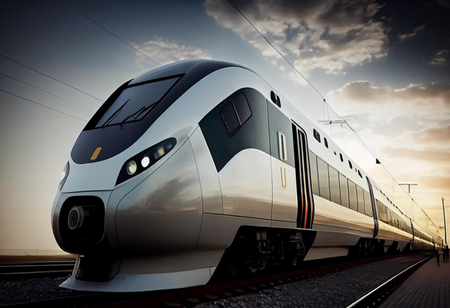
India intends to solicit expressions of interest from global firms to produce hydrogen-powered trains in the country using indigenous technology. Indian Railways is building a prototype train driven by hydrogen fuel cells, resulting in a more environmentally friendly locomotive than regular diesel-fueled locomotives.
"Our focus, now that we are almost fully electrified, is on getting more and more renewable energy and increasing the intake of green energy," Railways Minister Ashwini Vaishnaw said in an interview.
Few countries have the expertise to build hydrogen-powered trains, and India is moving "very well" in its efforts to develop the technology, he said, adding that "by the end of the current fiscal (year), we should be able to develop one prototype."
The trains would be built using this technology in collaboration with domestic and foreign railway system manufacturers. Once the prototype is complete, an invitation to express interest will be given next year.
Commercial operations of hydrogen-powered trains will place India in an exclusive club of railway systems that use zero-emission engines. Only Germany now operates commercial hydrogen-powered trains, with the United States, the United Kingdom, France, and Japan in the testing phase.
The Indian government intends to develop the technology by retrofitting hydrogen fuel cells onto diesel electric multiple unit (DEMU) rakes. Initially, this prototype is expected to run on the Jind-Sonipat part of the Haryana highway.
In her February Budget statement, Finance Minister Nirmala Sitharaman launched the 'Hydrogen for Heritage' initiative, a plan to operate hydrogen-powered trains on certain heritage and hilly routes that are environmentally sensitive. The Indian Railways has suggested operating 35 hydrogen trains at a cost of Rs80 crore per train, with ground infrastructure costing Rs70 crore per line.
For the current fiscal year, thirty-five train-set rakes (each with six coaches) have been sanctioned for eight sections: the Matheran Hill Railway, the Darjeeling Himalayan Railway, the Kalka-Shimla Railway, Kangra Valley, Bilmora Waghai, Patalpani Kalakund, Nilgiri Mountain Railways, and the Marwar-Goram Ghat.
The estimated cost of manufacturing one rake of six coaches with hydrogen propulsion is Rs80 crore, with ground infrastructure costing Rs600 crore. The ministry of railroads stated in February that while the initial operating costs of hydrogen-powered trains would be higher, they would be reduced as the number of such trains increased.

